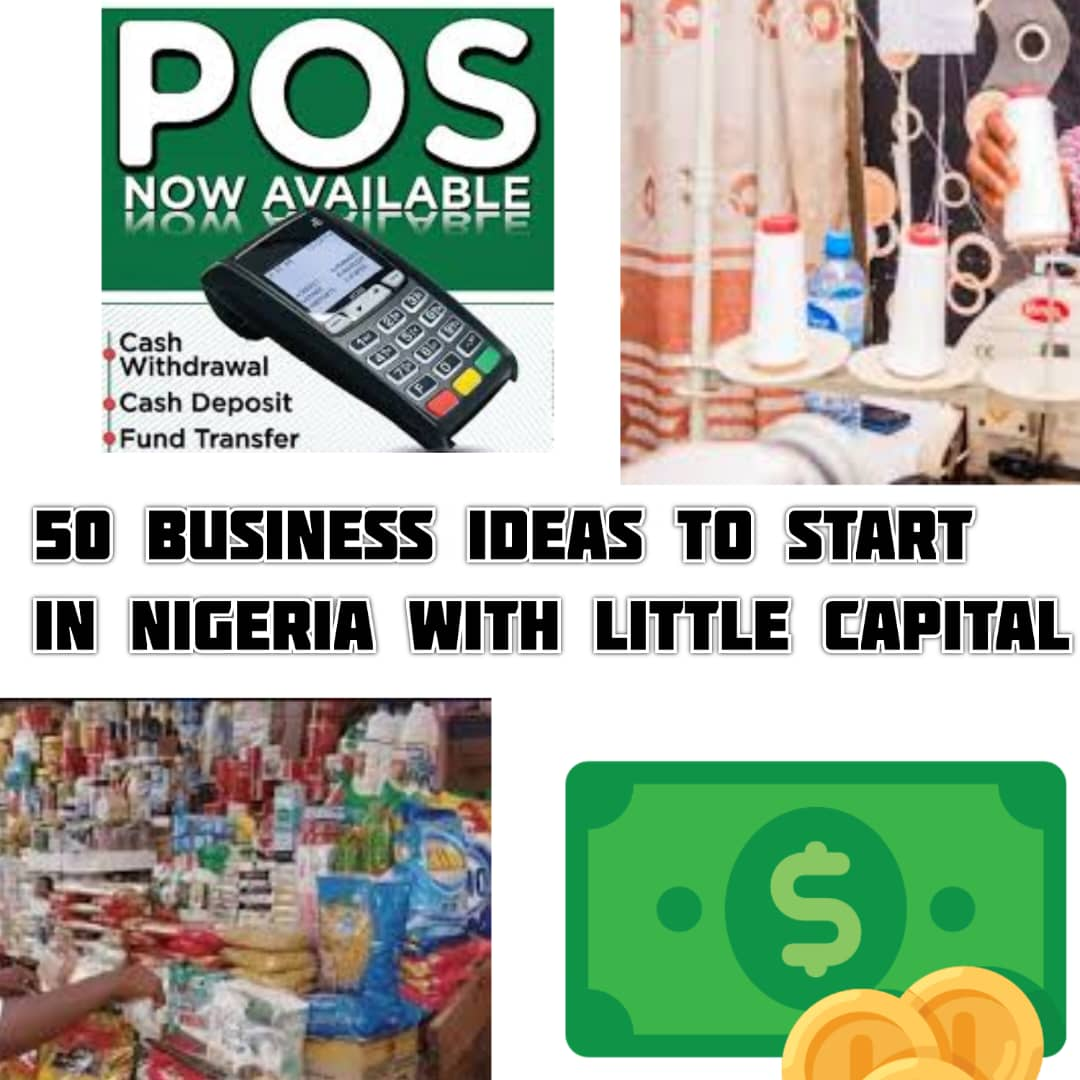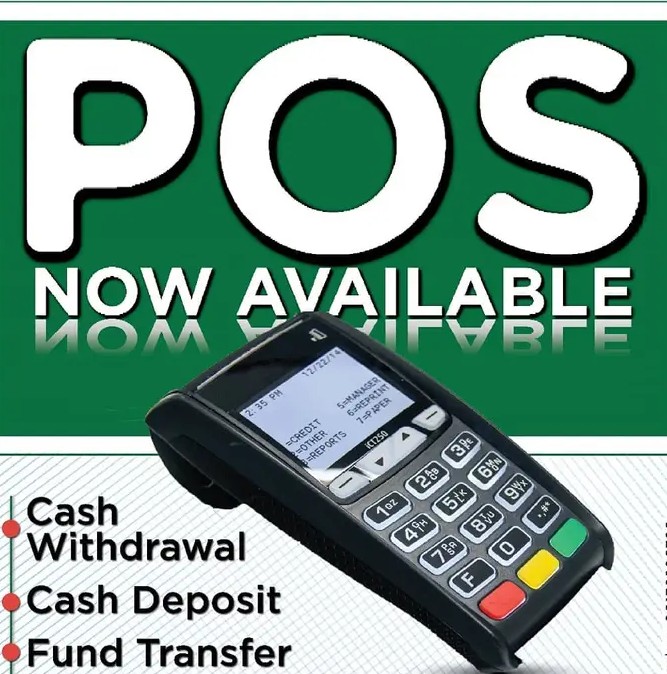Business
50 Business Ideas to Start in Nigeria with Little Capital
Published
7 months agoon

Nigeria is a nation of vibrant, innovative, and entrepreneurial people. Despite economic challenges, Nigerians have shown an incredible ability to create businesses out of limited resources. One of the biggest barriers to starting a business has always been capital. But times are changing. With right tools, growing local markets, and more open access to knowledge and community support, low-capital businesses are not only possible but thriving.
In this article, we’ll explore 50 business ideas that require very little capital to start but offer the potential for consistent income and long-term growth. Many of these ideas can be started from home, require minimal skills, and can be scaled with time. Whether you’re a student, stay-at-home parent, side hustler, or full-time dreamer, this guide is for you.
Let’s dive into the most practical, profitable, and proven low-capital business ideas for Nigerians.
1. Laundry and Ironing Business
Laundry and ironing is one of the most in-demand services in urban and semi-urban parts of Nigeria. Many working professionals, students, and busy families lack the time or energy to wash and iron clothes. With as little as ₦20,000 to ₦50,000, you can start a laundry business from your home. You’ll need basic supplies like a washing basin, detergent, iron, and drying space. As the business grows, you can invest in a washing machine or generator for power backup. Promotion can be done through local flyers, WhatsApp broadcasts, and referrals. Delivering fresh, well-ironed clothes with timely pickup and delivery can help you gain customer trust and scale your business.
2. Local Snacks Production
Nigerian snacks such as chin chin, puff puff, plantain chips, and buns are enjoyed by people of all ages. Starting a snacks production business is low-cost, easy to manage, and has a ready market. You can begin with less than ₦10,000 if you already have a kitchen. Focus on producing small batches, perfecting your recipes, and using hygienic packaging. Selling can begin in your neighborhood, schools, offices, or by supplying shops. As you build a customer base, you can explore branding, expand product variety, and supply in bulk to supermarkets. Promotion via Instagram or TikTok showcasing your preparation process can help boost trust and visibility.
3. Farming and Crop Sales (Urban Gardening)
Urban gardening allows you to grow fresh vegetables like ugu, scent leaf, okra, and tomatoes in small spaces using containers or grow bags. With limited land and capital, you can start a backyard garden with as little as ₦5,000 for seeds and compost. These crops grow fast and are always in demand. Urban dwellers, local markets, restaurants, and neighbors form a good customer base. Promote via social media or WhatsApp status for home delivery. Over time, your farm can become a steady stream of income, and you could even host training or sell seedlings to others.
4. Poultry Farming (Small Scale)
Poultry farming is a profitable agribusiness that doesn’t require much space or huge startup capital when done on a small scale. You can start with 10 to 50 broilers or layers, a basic poultry cage, feeders, and local feed. With ₦30,000 to ₦70,000, you can raise birds for meat or eggs. Broilers mature within 6 to 8 weeks, making it possible to earn within a short period. Sell to neighbors, restaurants, or live markets. Proper hygiene and feeding are essential. You can reinvest profits into buying more birds or upgrading your structure. The demand for fresh chicken and eggs is always present.
5. Fish Farming (Catfish)
Catfish farming is another lucrative agribusiness that can be started with little capital. All you need is a small tank, concrete pond, or plastic container, clean water, and fingerlings. With ₦50,000 to ₦100,000, you can buy fingerlings, feed, and set up a small operation. In about 5–6 months, your fish can be harvested and sold live or processed into smoked catfish. Smoked catfish sells well locally and abroad. Schools, restaurants, and market women are your best customers. Managing water quality and feeding schedules is crucial to avoid loss. As you grow, you can offer training or sell fish feed.
6. Soap and Detergent Production
Homemade soap, liquid wash, and detergents are used daily in every household and business. This business requires simple training, affordable chemicals, and packaging. You can learn the process through YouTube or local workshops. With around ₦15,000 to ₦30,000, you can produce in small quantities and sell within your community, local shops, or on WhatsApp. Branding and good fragrance will help your products stand out. You can also diversify into laundry soaps or antiseptic solutions. Focus on clean packaging and affordable pricing for faster customer growth. Bulk supply to schools, hotels, or offices is also possible.
7. Tailoring and Fashion Design
Tailoring is a skill-based business that never goes out of demand. Nigerians love customized clothes, especially for events. If you already have sewing skills, you only need a sewing machine, fabrics, threads, and space. You can start sewing clothes from home and deliver to clients. As you build your brand, offer alterations, ready-to-wear lines, or bridal outfits. Social media is a great platform to showcase your work. With time, you can open a fashion studio or even teach others. This business requires creativity, attention to detail, and consistency in quality to grow.
ALSO READ Naira Harmonised – Presidency Declares
8. Ankara Bags and Shoes Making
With Nigeria’s fashion industry booming, there’s a growing interest in unique accessories made from Ankara and other local fabrics. You can learn how to make Ankara bags, purses, slippers, and shoes online or through mentorship. Initial materials include fabrics, glue, cardboard, and basic tools, costing around ₦20,000–₦50,000. Begin by selling to friends, family, or local shops. Instagram and fashion expos are great for reaching stylish customers. You can also offer matching accessories for wedding or party outfits. As your creativity grows, you can brand your designs and attract international orders.
9. Plantain Chips Production
Plantain chips are one of the most popular snacks in Nigeria. You can start by buying unripe plantains, slicing and frying them, and packaging in sealed nylon or branded pouches. This business can be launched with ₦10,000–₦30,000 if you already have a kitchen. Ensure hygienic preparation, consistent taste, and crispy texture. Sell to local shops, schools, and via delivery. With good branding, your chips can stand out on shelves. Expand by introducing flavors (pepper, barbecue), bulk supply, and even exports. Proper labeling and NAFDAC registration can position you for supermarkets.
10. Face Painting for Kids Parties
Face painting is a creative business that brings joy to kids during birthdays, school events, and carnivals. It’s a fun weekend business that requires little more than a face painting kit, practice, and a portfolio of designs. You can charge per child or per hour at events. Learn basic designs like animals, butterflies, or cartoon characters. Market your service through parents, schools, or event planners. Keep your kit hygienic and use safe, child-friendly products. As you grow, add balloon sculpting, games, or costumed characters to your service list.
11. Hairdressing or Barbering
Hair grooming is a recession-proof business that remains consistently in demand across Nigeria. Whether it’s braiding, cutting, styling, or treating hair, everyone needs grooming services regularly. Starting a hairdressing or barbering business requires minimal capital—just a clipper, scissors, combs, mirrors, and a small chair. If you have space at home, you can convert a section into your salon. With ₦30,000–₦60,000, you can set up a basic outfit. To grow your clientele, promote on WhatsApp, offer discounts to first-timers, and focus on delivering excellent service. Consider adding value with services like hair washing, dyeing, or loc maintenance. As your business grows, you can offer home service or expand into a unisex salon.
12. Car Wash Business
The car wash business is highly profitable, especially in busy cities where vehicle owners want quick, affordable cleaning services. With access to water, space, and a few tools like buckets, brushes, and soap, you can begin washing cars for a fee. Starting with as little as ₦15,000, you can establish a roadside or mobile car wash. Target offices, markets, or residential areas where cars are regularly used. Build loyalty by offering bonuses for return customers or weekly plans. Over time, you can introduce vacuuming, polishing, and engine wash services, and invest in power washers or boreholes for efficiency.
13. Foodstuff Packaging
This business involves repackaging food items like rice, beans, garri, flour, crayfish, or pepper into smaller, affordable units for resale. With many people buying in small quantities, this model suits students, market women, and busy professionals. You’ll need clean packaging bags, a scale, and a sealable brand. With about ₦20,000, you can purchase bulk food items and start repackaging them. Sell in your neighborhood, online, or to small retailers. Hygiene and consistency in measurement are key to customer trust. Over time, you can brand your products and target supermarkets, restaurants, or even export opportunities.
14. Ice Block Production
In hot climates like Nigeria, the demand for cold drinks and preserved food is massive. Ice block production is a great small-scale business you can start from home, especially in areas with poor electricity. All you need is a deep freezer, generator, plastic containers or bags, and water. With about ₦50,000–₦100,000, you can produce and sell ice blocks to drink sellers, food vendors, and event organizers. Profit depends on your production cycle and power supply. This business scales well, and you can even rent cold storage space or supply hotels and caterers long-term.
15. Pet Breeding or Grooming
Pet care is a growing niche in urban Nigeria. Many pet lovers are now seeking services such as dog breeding, grooming, walking, or boarding. You can start a pet grooming business with minimal tools—combs, shampoo, clippers, and towels. Target dog owners who lack time or space to manage pet hygiene. Breeding small dogs like Lhasa Apso, Maltese, or local breeds is also profitable if you understand animal care and vaccination. Pet businesses require patience, good hygiene, and trust. Promote your services on pet forums, Facebook groups, or local vet clinics.
16. Herbal Mixture Production
Natural and herbal wellness products are gaining popularity in Nigeria. You can learn to prepare local remedies like agbo (herbal tonic), black soap, or skincare oils using natural ingredients. This business can be started with ₦10,000–₦30,000, focusing on clean packaging and compliance. Sell to family, friends, or local markets. Trust is key, so ensure quality and proper labeling. Offer sample packs, testimonials, and digital promotions. Herbal beauty brands are expanding fast, and you could eventually register with NAFDAC and sell in retail outlets or online stores.
17. Interior Decoration Services
Interior decoration services are perfect for creatives with a good eye for design. This business involves helping homes, offices, or shops achieve a more beautiful or functional setup. You can start by offering consultation and low-budget upgrades like curtain changes, wall art, or furniture arrangement. With social media platforms like Instagram, you can showcase your before-and-after transformations. No huge capital is needed—just networking, creativity, and possibly learning tools like SketchUp or Canva. As you grow, you can take contracts for weddings, homes, offices, and even real estate projects.
18. Photography Services (Freelance)
Photography is a high-demand service, especially for events, portraits, and product promotion. Start small with your smartphone and learn basic editing via apps or software. If you have a camera, that’s a plus. Begin by taking professional shots at birthdays, naming ceremonies, or church events. Offer competitive pricing and build a digital portfolio. Promote your services on Instagram, Facebook, and WhatsApp. Expand by offering printed photo books, framing, or studio sessions. Long-term, you can explore niches like wedding photography, real estate shoots, or corporate branding.
19. Skincare Products Formulation
With more Nigerians focusing on appearance and wellness, skincare is a hot niche. You can start formulating body scrubs, oils, soaps, or creams using natural ingredients like shea butter, turmeric, and essential oils. Take an online or physical course for safety and effectiveness. With ₦20,000–₦50,000, you can create sample products and packaging. Market to friends, on Instagram, and in beauty groups. Clean branding and customer reviews will drive repeat business. Over time, you can launch a full skincare line and even teach others.
20. Food Delivery Service
Many busy workers and students prefer home-cooked meals delivered to them. Starting a food delivery service requires basic cooking skills, kitchen utensils, and packaging. With ₦20,000–₦50,000, you can begin by preparing meals from your kitchen and taking orders via WhatsApp or Instagram. Focus on consistency in taste, hygiene, and prompt delivery. Target offices, hostels, or events. Offer daily menus, subscription plans, or meal prep services. Partnering with dispatch riders and using Google Maps can improve reach. As demand grows, expand your kitchen or hire staff.
21. Recharge Card Printing
The recharge card business is a fast-moving, low-risk venture. With access to a laptop or smartphone and a basic printer, you can start printing recharge pins for various mobile networks. Initial setup costs are around ₦20,000–₦40,000, including vendor registration and printing materials. You’ll earn by supplying retailers and individuals with recharge cards in bulk. This business works best in areas with high demand and limited access to digital banking. As the business grows, consider selling data bundles, utility bill payments, or becoming a mobile money agent. Consistency and strong vendor relationships are key.
22. POS Business (Mobile Banking)
POS business, also known as mobile money or agency banking, is one of the most profitable ventures in Nigeria today. You’ll need a POS terminal (available from banks and fintech providers), startup capital for cash float, and a secure location. With ₦50,000–₦100,000, you can begin offering withdrawals, transfers, airtime recharge, and bill payments. Ideal locations include markets, bus stops, or busy streets. Daily profit ranges from ₦2,000 to ₦10,000, depending on transaction volume. Stay trustworthy, record transactions, and ensure safety for success and longevity.
23. Real Estate Agent Services
Real estate agency requires little to no capital if you already live in a growing urban area. Your job is to connect property owners with prospective tenants or buyers and earn commission. Start by building a network of landlords, developers, and legal professionals. Promote property listings on WhatsApp, Facebook groups, or local posters. Be professional, honest, and responsive. You can specialize in rentals, sales, or short-let management. As you gain experience, formalize your operations with a business name and office. Trust and client satisfaction are essential for long-term success.
24. Rental Business (Chairs, Coolers, etc.)
Nigeria’s party culture creates demand for rental services—canopies, plastic chairs, tables, cooking pots, and coolers. You can start with just a few items and reinvest profits to expand. For example, chairs and coolers can be rented weekly for events, generating steady income. With ₦50,000–₦150,000, you can acquire secondhand items and store them safely. Maintain your items well, offer timely delivery, and work with event planners to increase bookings. In the long term, you can add sound systems, tents, and decoration materials to grow your rental empire.
25. Snail Farming
Snail farming is a quiet but profitable agricultural venture in Nigeria. It requires minimal space, low maintenance, and limited capital. A small snail pen can be built using old tires, wooden boxes, or net cages. Start with Achatina achatina or marginata snails. They eat kitchen waste, pawpaw leaves, or vegetables. With ₦10,000–₦30,000, you can begin a micro farm. Snails mature in about 6 months and can be sold to local restaurants, markets, or individuals. The business is environmentally friendly and scalable, and you can even process and export dried snails for extra income.
26. Mini Importation
Mini importation involves buying products in small quantities from overseas websites like Alibaba, 1688, or AliExpress and selling them in Nigeria for profit. With as little as ₦30,000–₦50,000, you can import items like phone accessories, beauty tools, or fashion items. The key is choosing trending or high-demand products. Learn how to use logistic agents and payment platforms to avoid delays. Sell your goods online via Jumia, Konga, or Instagram. It’s best to test with small stock before scaling. Good customer service and fast delivery will help you build a loyal base.
27. Graphics Design
Graphic design is an in-demand skill in today’s digital world. You can design flyers, logos, business cards, social media banners, and more. With free or affordable tools like Canva or CorelDRAW, you can start designing without a laptop. Invest in online tutorials and practice regularly. Offer services to small businesses, churches, schools, or event planners. Charge per design or offer retainer packages. As you grow, you can build a brand, teach others, or launch a design agency. Quality, speed, and creativity will distinguish you in this field.
28. Voiceover and Audiobook Recording
If you have a clear, expressive voice, you can offer voiceover services for radio ads, YouTube intros, animations, and audiobooks. All you need is a smartphone, quiet space, and free editing software like Audacity. Begin by offering samples and showcasing your voice on Fiverr or social media. Voiceover work pays well and can be done from home. As you grow, invest in a microphone and soundproofing materials. Nigeria’s media, education, and online industries are expanding, so voice talent is needed more than ever.
29. Bead Making and Jewelry Craft
Beaded jewelry is always in demand for weddings, cultural events, and fashion. With ₦10,000–₦20,000, you can buy bead kits and tools to make necklaces, bracelets, and earrings. Sell to friends, online, or through fashion boutiques. Offer matching sets and take custom orders for special events. Attend craft fairs and showcase your work on Instagram. Bead-making is flexible, creative, and profitable when you build a unique style. Later, you can teach classes or host DIY workshops to expand your income.
30. Mobile Phone Repair Services
Smartphone use is widespread in Nigeria, creating strong demand for repair services. Learn basic repairs like screen replacement, battery changes, or software fixes. You can apprentice or take online courses. With ₦30,000–₦50,000, buy basic tools and start from home or roadside kiosk. Offer services for Android and iPhones. Reliability, speed, and affordable pricing will win customers. Over time, expand into selling phone accessories, unlocking services, or training others.
31. Digital Marketing Services
Digital marketing is one of the most in-demand services in Nigeria, as businesses go online. Services include social media management, SEO, email marketing, and paid ads. With online courses and tools like Google Analytics or Canva, you can start freelancing for SMEs or personal brands. All you need is a smartphone, internet access, and a solid understanding of online trends. Offer packages to clients and build a digital portfolio. As you gain traction, start an agency or offer training to others.
32. Blogging or Vlogging
Content creation remains a profitable field if you’re consistent and focused. Choose a niche like tech, lifestyle, food, or travel, and create engaging blog posts or videos. You can monetize through ads, affiliate links, brand sponsorships, or digital products. Start with a smartphone and free blogging platforms like WordPress. Vlogging can be done on YouTube or TikTok. With time and quality content, you’ll grow an audience and attract income streams. Consistency and authenticity are key.
33. Affiliate Marketing
Affiliate marketing involves promoting products and earning commission for every sale made through your referral. You can start by joining affiliate programs from platforms like Expertnaire, Jumia, Amazon, or Konga. Share your links on blogs, WhatsApp, Facebook, or YouTube. With good copywriting and persuasive reviews, you can drive traffic to your links and earn passively. It’s ideal for people who want to make money online without owning products. Focus on building trust and providing value to your audience.
34. Freelance Writing
Freelance writing is great for those with strong English and writing skills. You can write blog posts, product descriptions, academic content, or business plans. Create samples and pitch clients on platforms like Upwork, Fiverr, or LinkedIn. With time, build a personal website to showcase your portfolio. Writers can charge per word, article, or monthly retainers. Niche writing—health, finance, tech—pays even more. It’s flexible, remote, and scalable.
35. Social Media Management
Businesses need help managing their social media accounts, posting content, and engaging followers. If you understand Instagram, Facebook, or Twitter, you can manage pages for SMEs and individuals. Start by offering free trials to build trust. Then, charge monthly fees for content scheduling, engagement, and analytics. You can use tools like Buffer or Canva to streamline your work. With a smartphone and strategy, you can manage multiple clients from anywhere.
36. Online Mini Courses
If you’re skilled in any area—makeup, Excel, baking, writing, marketing—you can turn that knowledge into money by creating a mini-course. Use platforms like Selar or Teachable to host your content. Record lessons with your phone or PowerPoint. Market through social media or WhatsApp groups. Nigerians love to learn skills online for better jobs or side income. Keep it simple, practical, and affordable. Add a certificate to boost credibility.
37. Online Tutoring (JAMB, WAEC)
With education going digital, you can tutor secondary school students preparing for WAEC, JAMB, or NECO. Offer virtual lessons via Zoom, WhatsApp, or Telegram. Start with subjects you’re good at, and share free tips to attract parents. With time, offer paid revision classes or sell practice materials. All you need is subject knowledge, internet, and communication skills. This business is both profitable and impactful.
38. Typing and Document Services
This is perfect for students or graduates with laptops. Offer services like typing, CV writing, assignment formatting, and photocopying in academic or business hubs. Set up in a school, church, or from home. Charge per page and offer discounts for bulk projects. Promote via flyers, WhatsApp, or Google My Business. With time, you can add printing, scanning, or lamination services for more profit.
39. Dropshipping Business
Dropshipping lets you sell products online without holding inventory. You partner with suppliers who ship directly to your customer. All you need is an online store (Selar, Shopify, or WhatsApp catalog), product images, and marketing. Focus on high-demand items like skincare, gadgets, or clothing. Your job is to handle customer service and promotion. This business saves you the cost of stock and warehousing while earning from price markups.
40. E-book Writing and Selling
If you have knowledge on a subject—health, business, fashion, tech—you can write an e-book and sell it online. Use Google Docs or MS Word to write and design it with Canva. Platforms like Selar, Paystack, or Amazon Kindle allow digital sales. Promote on WhatsApp, Twitter, or via email. E-books sell well when they solve real problems or teach high-demand skills. You can even bundle them with coaching.
41. Face Mask and Cap Production
During and after the COVID-19 era, face masks became an essential product. You can sew reusable cloth masks or simple hair bonnets/caps from Ankara or plain fabric. Start with a sewing machine, elastic, and fabric for as low as ₦10,000–₦30,000. Sell to offices, schools, or retailers. Branding and clean packaging make a big difference. Market through fashion vendors or events.
42. Errand and Delivery Services
Busy professionals often need help with grocery shopping, item pickups, or queueing services. With a bike or even on foot in tight areas, you can offer these services and charge per trip. Focus on residential areas, hospitals, banks, or corporate offices. Deliver value by being fast, trustworthy, and reachable. Build a loyal customer base and later hire more hands or register with logistics firms.
43. Tutoring Services
Offline or home tutoring is still popular among parents. Offer to tutor students after school hours in core subjects like Math, English, or sciences. With zero capital, just your knowledge and contact with parents or guardians, you can start earning. Expand by tutoring multiple children in one location or preparing students for entrance exams. Add digital learning materials or practice booklets for extra income.
44. Online Business Consulting
If you’ve built a business, brand, or skill, you can offer consulting services to others starting out. Package your experience into paid Zoom sessions, audits, or one-on-one coaching. Create a profile on LinkedIn, share testimonials, and show your process. Offer niche-specific help—IG marketing, personal finance, Shopify setup, etc. This is a premium service that earns more as your credibility grows.
45. WhatsApp TV Business
WhatsApp TV involves growing a WhatsApp status audience and charging for ads. Start by picking a niche—gossip, business, trends, or news. Share engaging content daily to keep viewers. Offer affordable ads to small brands or promote affiliate links. As you grow to 1,000+ viewers, charge per status update. Add a Telegram group or email list to scale your audience base.
46. Sell Canva or Design Templates
If you’re good with Canva or design tools, you can create templates for business cards, resumes, social media, or flyers and sell them online. Use Selar, Paystack, or Gumroad. Offer value by making your templates editable and easy to use. Market in groups, to coaches, or startup founders. It’s passive income that keeps selling even while you sleep.
47. Influencer Marketing
If you have a sizable and engaged audience on TikTok, Instagram, or YouTube, brands can pay you to promote their products. Start by building your niche, creating valuable content, and networking with brands or PR agencies. Micro-influencers earn from ₦10,000 per post and grow as their following increases. Stay authentic and transparent to build trust.
48. Domain Flipping
Domain flipping involves buying catchy domain names and reselling them for profit. You can register domains for as low as ₦3,000 and resell for thousands more. Look for trending names, business-related terms, or expired domains. Use platforms like GoDaddy Auctions or Namecheap. It requires patience but can be very profitable.
49. SEO Services
If you understand how search engines work, you can help businesses rank better on Google. Learn the basics of keyword research, on-page SEO, and backlinks. Offer audits, blog optimization, or website setup for small businesses. Charge per service or monthly retainers. Start by helping friends or small brands and use testimonials to grow.
50. Copywriting
Copywriting is the skill of writing words that sell. It powers ads, landing pages, product descriptions, and emails. Learn from free resources or paid courses. Offer services to brands selling products or running campaigns. Charge per project or retainer. Great copywriters are always in demand and can earn both locally and internationally.
Conclusion: Pick One, Start Small, Grow Big!
You don’t need millions to start a business in Nigeria. All you need is consistency, skill, and a small start. Choose any of these 50 business ideas, start with what you have, and grow over time.
With the right mindset and digital tools, your low-capital hustle can become your biggest source of income.




